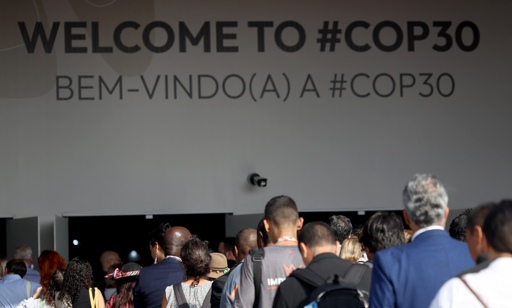In his final letter published on the eve of COP30’s opening day on Monday, the summit’s Brazilian boss André Aranha Corrêa do Lago spelled out his top priority: ensure that the nearly 200 disparate country delegations gathering in Belèm “evolve into one cohesive team”.
But his hopes of channelling global togetherness look set to get a reality check. A familiar battle is brewing over the conference’s agenda for the coming two weeks, after negotiating groups tabled six proposals for additional topics to be discussed.
Emerging economies ask for talks on finance and trade
Two come from the Like-Minded Group of Developing Countries (LMDCs), which includes China, India and Saudi Arabia, with support from the Arab Group of predominantly oil-rich nations and cover well-trodden territory: finance and trade.
On finance, the bloc wants dedicated discussions on Article 9.1 of the Paris Agreement, which sets out an obligation for developed countries to provide financial help for developing nations’ efforts to cut emissions and adapt to a warming world.
Their demand that rich governments stump up cash is nothing new. But that has now been fuelled further by disappointment over the outcome of last year’s negotiations which produced the new UN climate finance goal of $300 billion a year by 2035. The LMDCs are now calling for a three-year “work programme” to discuss how the provision of money from developed nations under Article 9.1 is crucial to reach a broad range of goals in the Paris accord.
 Nov 5, 2025News
Nov 5, 2025News
Five big questions hanging over COP30
From insufficient emissions-cutting plans to a shortfall in adaptation finance, here’s our guide to the thorny issues facing the UN climate summit in BelémRead more Nov 7, 2025News
Nov 7, 2025News
Health check: 10 years of the Paris Agreement
A decade since the deal was adopted, climate experts say it is working to cut emissions, spur action and reduce the projected temperature rise – but not as fast as we need it toRead more
The bloc also wants the summit to tackle “unilateral trade-restrictive measures”. That is code for mechanisms such as the EU’s carbon border adjustment mechanism (CBAM), which is essentially a carbon tax on imports aimed at creating a level-playing field between domestic and overseas producers.
But emerging economies – such as China and India – say those measures are protectionist, do not take different levels of development into account, and would harm their economies. They have been calling for the inclusion of this agenda item at the previous two COPs – but so far have not succeeded in their bid to separate the topic out from existing discussions.
Since taking on the presidency, Brazil has been trying to defuse a likely COP30 agenda fight over trade measures. But Do Lago’s proposal to create a new forum to discuss climate and trade outside of the UN climate regime was met with a lukewarm response.
Small islands push ‘survival’ agenda
Hot on the heels of UN chief Antonio Guterres conceding that a breach of the 1.5C warming limit is “inevitable”, the Alliance of Small Island States (AOSIS) has put forward a proposal for discussions on how to react to that and raise emission-cutting ambition.
The group, predominantly composed of low-lying Pacific island nations, wants to create a dedicated space to agree “on concrete follow-up actions” to accelerate implementation of efforts before 2030. This also feeds into existing divisions over how COP30 should respond to a wide shortfall in ambition in countries’ updated national climate plans (NDCs) submitted this year.
“We are proposing this agenda item because the world’s current trajectory toward climate catastrophe is unacceptable – morally, scientifically, and legally,” said AOSIS Chair Ambassador Ilana Seid. “For small island nations, this is not about negotiation tactics – it’s about survival.”
The EU, for its part, wants dedicated discussions over a transparency mechanism of the Paris Agreement that requires countries to report a vast amount of national-level information, including inventories of greenhouse gas emissions and measures taken to act on promises made in their NDCs.
In its submission, the EU says it is “crucial” that good practices are shared and that barriers to boosting climate action are identified and urgently fixed.

Drone view from Combu Island, with the city of Belem in the background. Photo: Alex Ferro/COP30

Drone view from Combu Island, with the city of Belem in the background. Photo: Alex Ferro/COP30
Forests, mountains and health
Forest nations Honduras, Suriname and Papua New Guinea, meanwhile, are calling for discussions on the need for an “urgent” increase in financial support for global efforts “to reverse global deforestation and degradation by 2030” – one of the key agreements made at COP28 in Dubai two years ago.
Two additional proposals came in at the last minute on Sunday from Zimbabwe and Kyrgyzstan, respectively.
The Southeast African nation wants to create a new space for discussions on the impact of climate change on health. Its submission calls for a “structured dialogue” between negotiators and health experts that could come up with concrete actions to advance health considerations in adaptation interventions and meet the needs of the most vulnerable communities.
The Central Asian country wants better integration of mountain-related issues into the global climate agenda and, more specifically, the creation of an Annual Expert Dialogue on Mountains and Climate Change.
In an attempt to enable the smooth adoption of the conference agenda and prevent fireworks at the opening session, the COP30 presidency met with heads of government delegations on Sunday. The plenary will show whether those efforts to accommodate new agenda demands have been successful.
The post COP30 Bulletin Day 1: Agenda fight looms over opening day appeared first on Climate Home News.
From Climate Home News via this RSS feed

